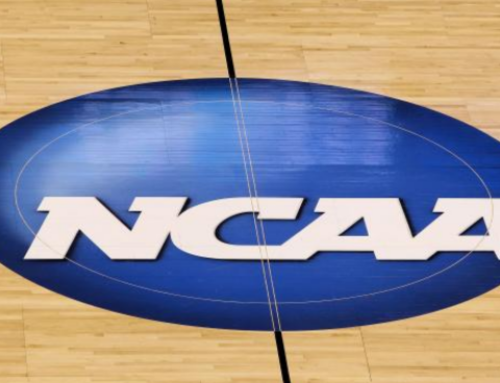How Young Athletes Can Productively Push Past Mistakes
Mistakes.
We all make them, even without the stress of competition looming. We make wrong turns, we drop things we didn’t intend, and we say things without filtering our thoughts. Add the pressure of competition to the mix, and the chances for mistakes escalate.
As athletes compete and strive to get better, mistakes are simply part of the process. If you are not making mistakes, you probably aren’t making progress. While we can’t eliminate mistakes from the athletic process, we can learn to manage them more productively. As a former coaching friend of mine once told me, our responses to mistakes often hold the pen to our reputation. When you make a mistake, be it on or off the field, court or track, how will that affect your story? Will it cause you to compound the issue and self-destruct, or will you use it as a learning opportunity and ultimately be better off?
Following these three simple steps can help you overcome your mistakes and even use them as a launching pad to get somewhere greater.
1. Own Your Mistake
Owning your mistake is the first step toward overcoming it. It can be scary to own your mistake, but there’s ultimately no better way to move forward. By blaming others, you remove your power to change. Realize that the mistake was a moment in time that is now behind you. We can’t go back in time. But we can own the fact that we made a mistake and use that ownership to inform our next decisions. Blaming and defending a mistake will not get you any closer to achieving the growth and improvement you need to push past that mistake.
2. Work to Find the Improvement
Now that you’ve taken ownership of your mistake, how are you going to learn from it? Take accountability by seeking to improve your technique, understanding or position to avoid repeating the same mistake. The worst thing you can do is resign yourself to the idea that the mistake is in your nature and you have no way to avoid it. Your mistake cannot define you. If you allow it to, it will impede your abilities to improve and receive feedback from coaches, teammates, etc. Confidence is created by your improvements. Identify the improvements that can help you avoid making the same mistake in the future, and get to work on making them happen.
3. Intelligently Expend More Effort
One thing you can always control is your effort. Make an effort to be accountable, learn from your mistake, and make the necessary improvements. If you’re still stuck in the past and haven’t owned your mistake or are shifting blame, then you’re expending your effort in the wrong places. Focus on the next play and control what you can control. Be aware of the mistake you made in the past, but don’t live in fear of making another. The only way you’ll be able to move on from a mistake is with sustained effort in the right places.
No matter what your mistake might be, taking those three steps, in order, can help you productively push forward.
But how should you act when a teammate makes a mistake?
Breathe confidence, not criticism, into your teammates. Adam Grant, Professor at the Wharton Business School and best-selling author of Give & Take, often brings up the fact that neuro-imaging research has found our brains respond more positively to leaders who have shown us empathy. They need to own their mistakes just like anyone else, but once they’ve done that, help them identify their improvements and expend intelligent effort. Encouragement means to give courage. How you respond to a teammate’s mistake will influence the trust you have moving forward.
What if you’re a coach and one of your players has made a mistake?
Demonstrate resilience and not discouragement to your athletes. In a study from New York University, researchers found the more someone looks up to their leaders and are moved by their compassion or kindness), the more loyal they become. As coaches, we seek a loyal commitment. Athletic success will almost always require it. Have compassion, then seek the correction! Notre Dame head basketball coach Mike Brey is a master at this coaching tactic.
Photo Credit: jpbcpa/iStock
READ MORE:
RECOMMENDED FOR YOU
MOST POPULAR
How Young Athletes Can Productively Push Past Mistakes
Mistakes.
We all make them, even without the stress of competition looming. We make wrong turns, we drop things we didn’t intend, and we say things without filtering our thoughts. Add the pressure of competition to the mix, and the chances for mistakes escalate.
As athletes compete and strive to get better, mistakes are simply part of the process. If you are not making mistakes, you probably aren’t making progress. While we can’t eliminate mistakes from the athletic process, we can learn to manage them more productively. As a former coaching friend of mine once told me, our responses to mistakes often hold the pen to our reputation. When you make a mistake, be it on or off the field, court or track, how will that affect your story? Will it cause you to compound the issue and self-destruct, or will you use it as a learning opportunity and ultimately be better off?
Following these three simple steps can help you overcome your mistakes and even use them as a launching pad to get somewhere greater.
1. Own Your Mistake
Owning your mistake is the first step toward overcoming it. It can be scary to own your mistake, but there’s ultimately no better way to move forward. By blaming others, you remove your power to change. Realize that the mistake was a moment in time that is now behind you. We can’t go back in time. But we can own the fact that we made a mistake and use that ownership to inform our next decisions. Blaming and defending a mistake will not get you any closer to achieving the growth and improvement you need to push past that mistake.
2. Work to Find the Improvement
Now that you’ve taken ownership of your mistake, how are you going to learn from it? Take accountability by seeking to improve your technique, understanding or position to avoid repeating the same mistake. The worst thing you can do is resign yourself to the idea that the mistake is in your nature and you have no way to avoid it. Your mistake cannot define you. If you allow it to, it will impede your abilities to improve and receive feedback from coaches, teammates, etc. Confidence is created by your improvements. Identify the improvements that can help you avoid making the same mistake in the future, and get to work on making them happen.
3. Intelligently Expend More Effort
One thing you can always control is your effort. Make an effort to be accountable, learn from your mistake, and make the necessary improvements. If you’re still stuck in the past and haven’t owned your mistake or are shifting blame, then you’re expending your effort in the wrong places. Focus on the next play and control what you can control. Be aware of the mistake you made in the past, but don’t live in fear of making another. The only way you’ll be able to move on from a mistake is with sustained effort in the right places.
No matter what your mistake might be, taking those three steps, in order, can help you productively push forward.
But how should you act when a teammate makes a mistake?
Breathe confidence, not criticism, into your teammates. Adam Grant, Professor at the Wharton Business School and best-selling author of Give & Take, often brings up the fact that neuro-imaging research has found our brains respond more positively to leaders who have shown us empathy. They need to own their mistakes just like anyone else, but once they’ve done that, help them identify their improvements and expend intelligent effort. Encouragement means to give courage. How you respond to a teammate’s mistake will influence the trust you have moving forward.
What if you’re a coach and one of your players has made a mistake?
Demonstrate resilience and not discouragement to your athletes. In a study from New York University, researchers found the more someone looks up to their leaders and are moved by their compassion or kindness), the more loyal they become. As coaches, we seek a loyal commitment. Athletic success will almost always require it. Have compassion, then seek the correction! Notre Dame head basketball coach Mike Brey is a master at this coaching tactic.
Photo Credit: jpbcpa/iStock
READ MORE:











